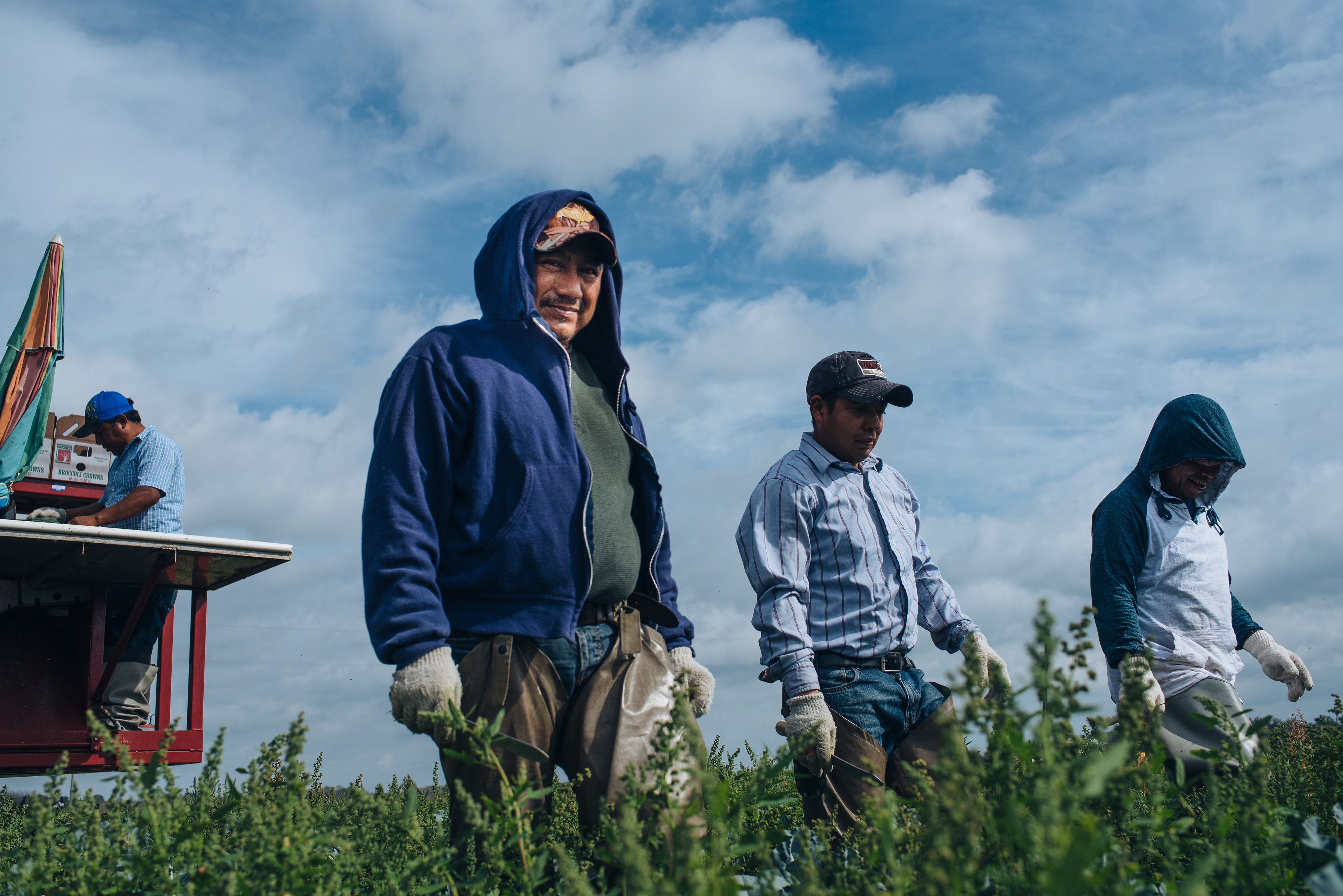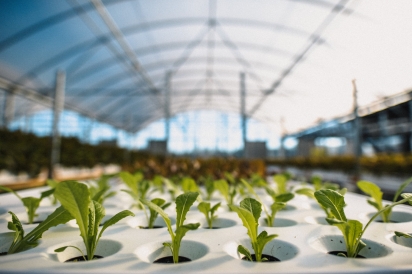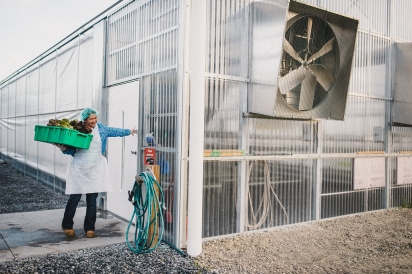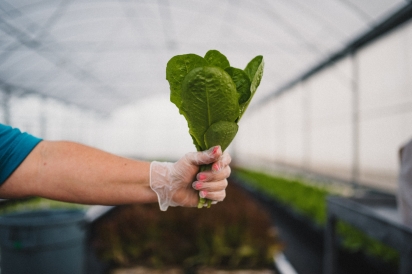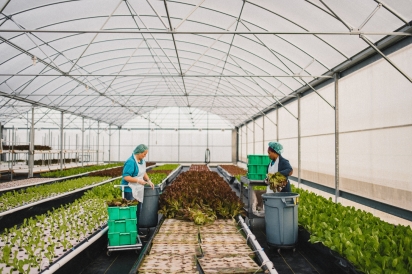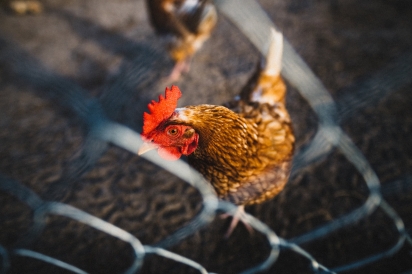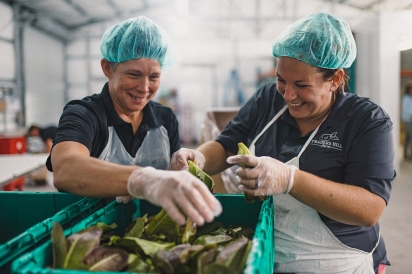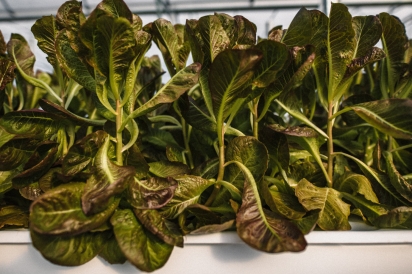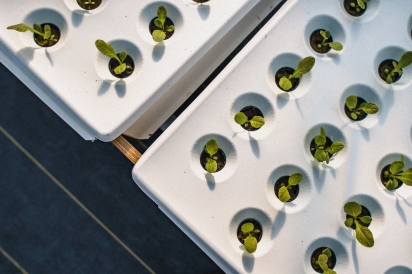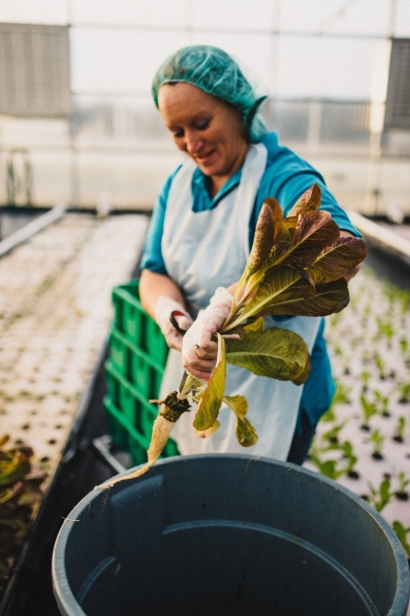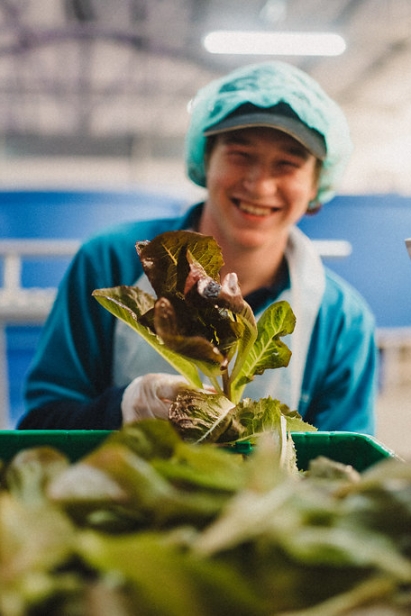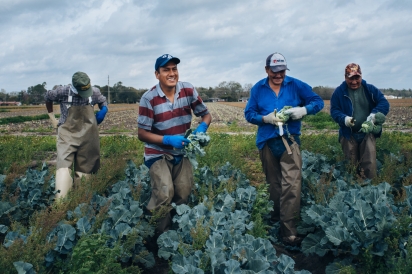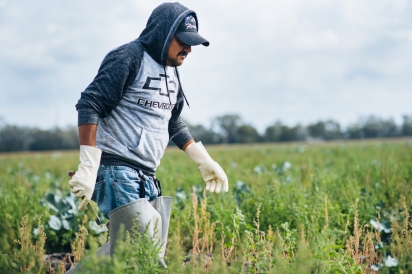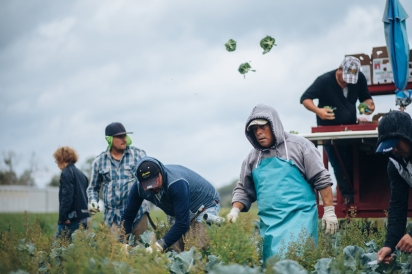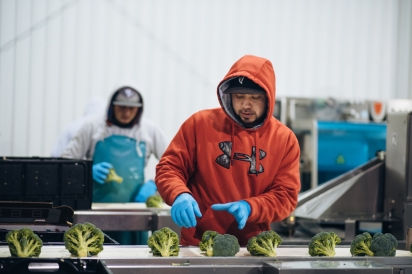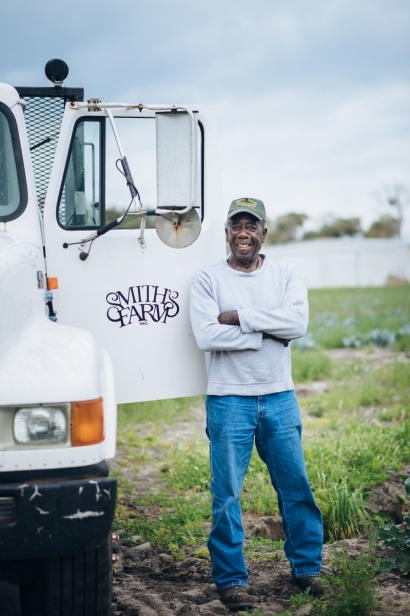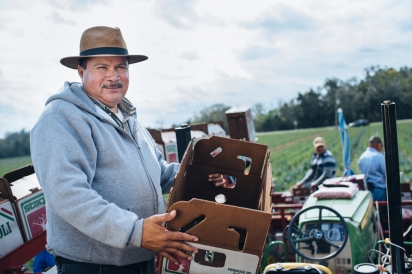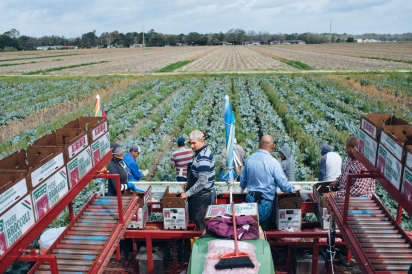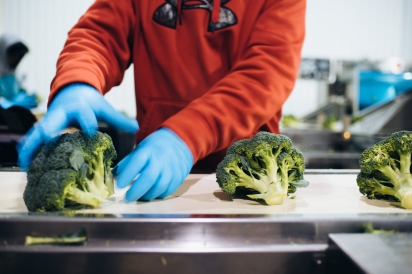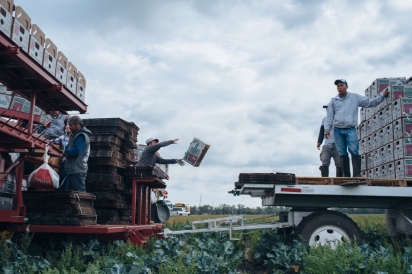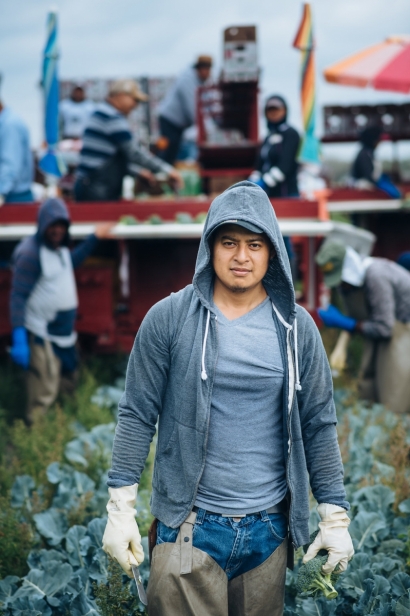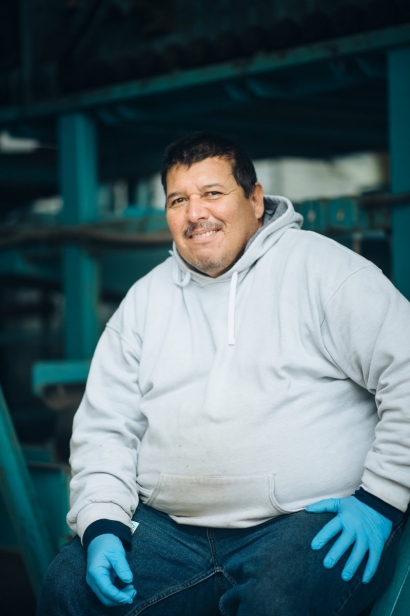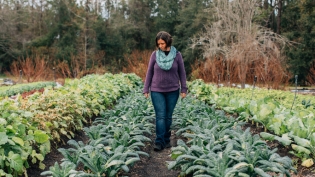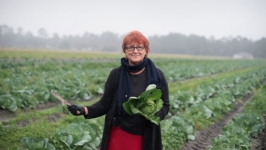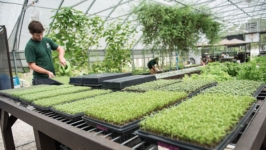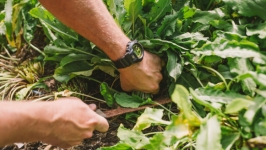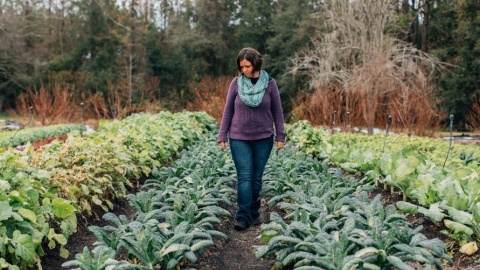Farmworkers in Northeast Florida
The rural city of Hilliard sits roughly 30 miles northwest of Jacksonville. In this part of the state, US 1 seems to stretch out as it transitions from an industrial thoroughfare to a bucolic parkway. Palm trees line the median cutting through downtown, and Hilliard – with one grocery store, a few gas stations, several “dollar” stores and no reasonable public transportation – is not dissimilar to other agrarian regions sprinkled across Florida’s nearly 70,000 square miles.
Mary Whiten grew up in Hilliard. As a child she used to work collecting eggs for the chicken farms in the area. One farm supplied eggs to Tyson, Inc. and, as Whiten recalls, paid children $11 a day.
“I used to garden at home when I was a kid,” Whiten hollers over the whirling of electrical noise and loud lapping of rolling waters, as she gives me a tour of Traders Hill Farm. Moments earlier, after rinsing off the soles of our shoes we ducked into a large greenhouse, roughly the size of a basketball gymnasium. Aside from the gentle roar of rushing water, a subtle “fishy” smell is emanating from six large royal blue basins.
I follow her up a small staircase to get a peek inside the containers. Roughly two hundred tilapia fish, their scales shining in various shades of brown and grey, are slithering around tanks. “We didn’t do any farming like this, that’s for sure,” Whiten said, pointing at the fish. “We grew in the dirt.”
Traders Hill practices a closed-loop farming process called aquaponics. Using live fish to produce waste water, Traders Hill’s crops are grown in the nitrogen-rich grow beds. The beds produce clean water, which is then recycled back to the fish. Using this process, Traders Hill grows fresh greens such as kale, lettuce, romaine and chard for restaurants and stores in Northeast Florida, such as Southern Roots, Community Loaves, Native Sun and Grassroots Natural Market.
Whiten was one of the first farmworkers hired at Traders Hill. She now serves as Crew Chief Leader, overseeing all the daily operations from cleaning the fish tanks to harvesting the greens to packing up the delivery orders. Whiten is one of 12 farmworkers employed by Traders Hill. She earns a salary, has access to benefits and enjoys five days paid vacation. She takes home lettuce and is treated to employee lunches several days a week. In fact, all the farmworkers at Traders Hill enjoy these perks.
Operators such Traders Hill founder Angela TenBroeck are doing their best to make farmworker compensation a major priority, but it’s not always easy, especially as the size of a farm operation increases. To understand some of the challenges, it is helpful to have a view of how farms are staffed, the source of the labor pool and the regulations that accompany agribusiness.
Data on farmworkers in Florida can be difficult to find. Much of our region's farm work is seasonal, undertaken by migrant workers. The Florida Department of Health, reports that 150,000 to 200,000 migrant and seasonal farmworkers and their families annually travel and work in Florida. The migrant labor camp program currently issues over 700 permits in 33 counties ensuring that 34,000 migrant and seasonal farmworkers, and families live in housing that meets or exceeds standards set by law.
A report by the Florida Association of Community Health Centers titled “Farmworkers in the Southeast” also offers some semblance of a profile.
The greatest number of farmworkers reside in Florida, which the report calls a “Sending State,” meaning that “migrant farmworkers use [it] as a home base” from which they migrate north and back, returning to Florida at the end of the northern agricultural seasons. Migrants from Mexico make up the greatest population of farmworkers in the Southeast. According to the U.S. Department of Labor's National Agricultural Workers Survey (NAWS), nearly 50 percent of the Southeast’s farmworker population is undocumented.
USDA’s National Agricultural Statistics Service reported in November 2016 that farm operators paid their hired workers an average wage of $13.25 per hour.
Obtaining accurate information about farmworkers is sometimes hard to find, and understanding all the dynamics affecting farm labor is a very complex issue. Yet, there is evidence in our region that suggests a bleak picture of migrant living and working conditions is not necessarily the norm. There are many farms in the area intent on providing livable wages and healthy housing conditions.
TenBroeck started Traders Hill Farm with the help of Dick and Bridgette Blaudow, who own the property. They’ve been community-minded from the beginning, hiring mostly from within the city of Hilliard, often single mothers, or women with no previous farming experience. Margins in farming are inherently small and income is dependent on what buyers will pay. By offering its employees a salary, Traders Hill is taking a risk in trying to change the way farm labor is compensated.
"It’s important to me that we take care of our people,” Ten-Broeck said. “It’s not easy. I’m an entrepreneur, living my dream. So far we’ve done well.”
Given the size and nature of her farm, TenBroeck is able to rely on local residents to run the operation. Larger growers with crops that need to be picked and packed within a season, however, may follow different hiring practices, and employ seasonal or migrant workers, especially given the local labor shortage in agriculture.
Migrant workers typically come to the US under an H-2A visa, which allows legal entry into the country for temporary or seasonal agricultural work, and employers must meet rigorous requirements to participate. The filing of an H-2A application is an extensive and expensive process. In Florida, members of the Florida Fruit and Vegetable Association have access to resources for help in completing the filing and processing guest worker entry and documentation.
Roughly 90 miles south of Hilliard, just east of Palatka, the small farming community of Hastings, population about 600, is home to fairly large-scale cabbage, broccoli and potato farms where several growers use both local and migrant seasonal harvest labor.
Many farmworkers live on farm labor camps, which are required by law to comply with various regulatory standards set by the government though enforcement of these regulations varies considerably from camp to camp, and gaps still exist. Florida county health departments are responsible for ensuring uniformity and continuity with Migrant Labor Camp Program rules, providing plan review and permitting, pre-inspection and routine inspections, investigations, education and application of state laws and regulations.
Tara Smith Vighetti is Vice President of Smith Packing, an East Coast grower/shipper of broccoli, cauliflower and potatoes with winter production at Smith Farms located in Hastings. Her family has been farming since 1859; along with her sister Emily and cousin Zachary, Tara is the sixth generation in the business. Smith’s operates with about 45 full-time employees for year-round tasks and about 300 migrant workers for seasonal harvesting and packing in various locations. While the full-time employees are either hourly or salaried with vacation time and other benefits, “we employ migrant labor for seasonal harvest jobs two ways, through the H-2A process and direct employment,” says Vighetti. “We don’t have a labor contractor, we have a crew foreman who helps us put the crew together and we contract directly with the employee. There is nobody in between.”
Vighetti acknowledges the farm’s commitment to providing quality housing and safe, healthy working conditions. “Doing the right thing can be expensive and it’s arduous and ongoing,” she says. “But it is just as important to us as anything. It’s as much a part of who we are as the product in the box.” She is proud of their housing, which is rigorously regulated and inspected by the county health department. The farm provides and maintains housing and transportation for the crews and pays cooks who live in the camp and prepare meals.
“This business is competitive. A stable migrant workforce is essential to our success. We want our people to want to come to work for us. Our crew foreman Antonio has been coming with our crew for over 20 years,” says Vighetti. “These people are family. This is not mindless manual labor. A trained farm harvest crew that knows the job, what to cut, what to leave, how to pack, is not a dime a dozen.
“For us to do business with the kind of companies we do business with, we have to operate in an environment of integrity for all. This is the kind of company we want to be because I want to be around for another generation. You don’t do that by trying to find the short cut,” Vighetti says.
Stella Mouzon first came to Hastings in 1998 with the St. Vincent’s Mobile Health Outreach Ministry and now serves as manager of the program. With a fleet of half a dozen vehicles, the outreach ministry provides preventative health and dental services to agricultural workers in both Putnam and St. Johns County.
“We’ve become [the farmworkers’] primary care doctor,” Mouzon said. “It’s a preventive model in that we are trying to maintain patients’ diseases so they don’t progress, but also we are trying to screen new patients.”
Much of the mobile health unit’s work involves educating farmworkers about protecting their skin with sunscreen, wearing sunglasses to prevent the development of cataracts and consuming nutritious foods.
“Diet is really the hardest thing to control,” Mouzon said. “We see a lot of diabetics and pre-diabetics.”
Farm owners and operators, corporate buyers, food retailers and the government all play a role in upholding workplace safety. And so do consumers. More than ever people want to know not only where their food came from but also about the integrity of the producers. Vighetti says “Retailers are beginning to ask for more assurances on social compliance with regard to fair labor practices.” Consumer behavior has become a major factor in reinforcing this and pushing the industry to show results.
The Produce Marketing Association and United Fresh, two of the largest agricultural industry associations have formed a Joint Committee on Responsible Labor Practices. The committee has so far drafted an Ethical Charter, which provides a framework for demonstrating and driving responsible labor practices across the supply chains, assuring workplace safety, respecting worker dignity and complying with all applicable legal requirements.
Vighetti acknowledges there may still be mistreatment of farmworkers, but says “despite the fact that these are the stories that get the most press, in my experience it is not the norm.” Change is taking place, pushed by both the supply chain and consumers. “What the consumer wants to know is what about the guy that picked this food? What’s his life like? Is he being treated well? Where did [the produce] come from? That is what is going to change the behavior,” says Vighetti. “Yes, it’s important to tell the story about people who aren’t being treated fairly.”
“It is just as important to tell the other side of the story. We all hear about the bad actors, and it's reprehensible, so we should. But there are also a vast number of farming organizations, mostly families like ours, trying to follow the law and pay for it, and sometimes struggling to do that because it can be expensive. Can we follow the law and have clean, safe, good conditions? Yes, and a lot of people are doing that.”
There are many groups advocating on behalf of farmworkers in Florida. Organizations like the Agricultural Justice Project (AJP) are developing certifications intended to help educate consumers about the ways in which farms treat their workers. To earn the Food Justice Certification developed by AJP, farms commit to higher standards regarding hiring practices, working conditions, pay, benefits and training for workers. Farms also have to agree to stipulations regarding negotiations, pricing and contracting with buyers.
Jordan Brown is the owner and operator of Family Gardens, an organic farm located on twenty acres in Gainesville and the first farm in the Southeast to earn a Food Justice Certification. Each of Brown’s five full-time employees earns a living wage. Brown, for his part, is understated about his commitment to the Food Justice Certification standards.
“Honestly, farmworkers are not asking for anything special,” he said with a soft, southern drawl. “All we’re trying to do is give people a regular job, with regular safety precautions, regular pay, regular rights and responsibilities.”
Family Gardens relies heavily on customers who enroll in its CSA, but fruits and vegetables the farm sells to grocers will carry a Food Justice Certification label, something that Brown hopes consumers will respond to. “I think consumers can help change things by demanding what’s right,” Brown said.
Back in Hastings, Mouzon reflected on her clients and how her nearly two decades working with impoverished agricultural communities has changed the way she buys produce.
“I didn’t know much about the lives of farmworkers when I first came on board,” she said. “It does change the way you think about your food. Now when I go into Publix to buy broccoli, I think about the men who’ve harvested it.”


